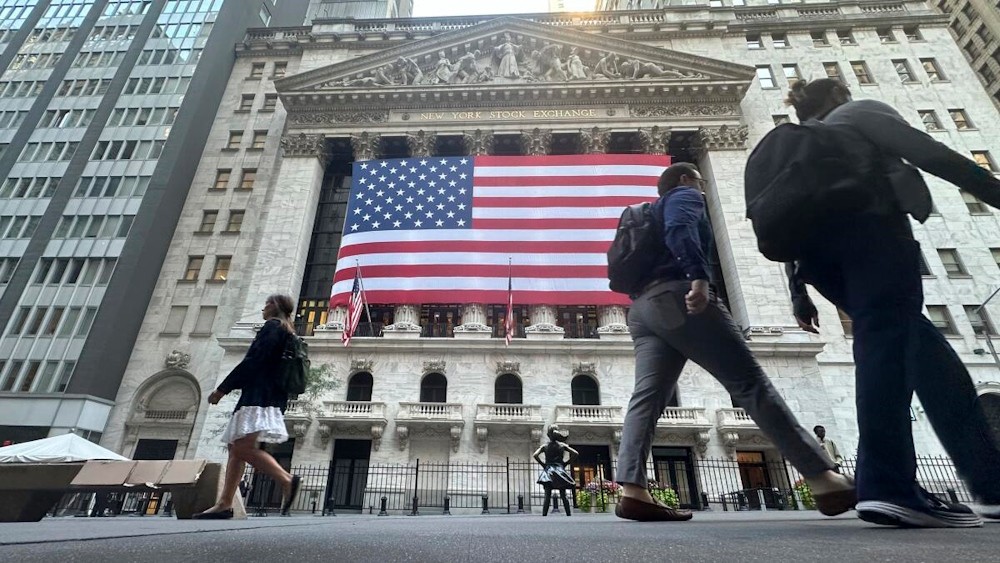
U.S. stock futures fall after President Donald Trump announces new tariffs that undermine the decades-old global trading system. Trump has threatened general tariffs on all imports and higher taxes on “bad actors” in trade. The implementation of previously announced auto tariffs will worsen trade tensions. Trump announced his most broad tariffs on Wednesday, imposing a 10% levy on all foreign imports into the U.S. He also proposes to raise tariffs on numerous long-standing trading partners in reaction to unfair trade practices.
China, the EU, India, and Japan will face higher “discounted reciprocal” tariffs to address foreign charges and non-trade barriers. The White House calls these nations “bad actors” in trade. Trump imposed a 34% duty on China at the White House Rose Garden, adding to the 20% levy from earlier this year. These tariffs are projected to hurt technology companies, according to Wedbush Securities analyst Dan Ives. Trump has often criticized EU imports, which currently face a 20% duty, while Indian exports to the US face a 26% tariff. Japanese imports will be taxed 24%.
The baseline 10% tax begins on April 5, and the higher charges begin on April 9. Trump and White House officials say these moves are necessary to fix trade imbalances, boost government revenue, and restore manufacturing jobs. “We are poised to return to a state of significant wealth,” Trump said. However, many economists have warned that these measures will raise costs and slow economic growth, and businesses have complained that tariff ambiguity has hindered their operational planning. “In the long term, it could benefit the U.S. economy; however, the implemented measures indicate a difficult transition period,” said ING Chief International Economist James Knightley.
After the decision, U.S. stock futures predicted a drop in equities and a weaker currency, causing Wall Street turmoil. The Dow futures contract fell 1,010 points, or 2.4%. S&P 500 futures plummeted 166 points, or 2.9%, while Nasdaq 100 futures fell 645 points, or 3.3%. Last trading session, primary indices rose slightly. Asian equities fell sharply after the announcements. Bitcoin fell as risk aversion lowered the dollar index, which tracks the greenback against a variety of currency pairs. Gold, traditionally a haven during market instability, maintained levels near record heights, while oil prices, which are sensitive to tariffs’ influence on global crude demand, fell.
Trump’s tariffs are nearly as bad as conceivable, Vital Knowledge analysts wrote in a client note. “Instead of adopting a conciliatory stance that highlighted the possibility of tariff reductions in the near future after negotiations, Trump characterized his new duties as an essential measure to correct years of unfavorable trade agreements and restore a weakened U.S. manufacturing sector.” Additionally, fresh duties were added to reciprocal tariffs on Thursday.
All non-US-made cars are subject to a 25% tariff as of midnight. The U.S.-Mexico-Canada Agreement, a Trump administration trade accord, exempts autos from these tariffs for now. Automotive items will be subject to import duties from May 3. During after-hours trade, Ford, General Motors, and Stellantis, Jeep’s parent company, saw shares fall. Trump already imposed duties, including a 25% import duty on non-USMCA Mexican and Canadian goods. Energy items and potash are 10% tariffed. No more duties will be imposed on either nation. All steel and aluminum imports were taxed 25% in March. Metals, automobiles, and their parts are excluded from the new tariffs. Non-domestic energy and minerals will also be exempt. Trump wants to impose a 25% tariff on imported copper and lumber and on any country that buys Venezuelan oil and gas.
Trump’s announcement of hefty new tariffs and earlier statements have escalated the global trade war. Global reactions followed concerns about the White House’s openness to negotiate improved trade accords. China will submit its own remedies, claiming a global trade war has no winners. The tariffs were unilateral coercion, according to the trade ministry. President Ursula von der Leyen said the EU will collectively address taxes because “if you take on one of us, you take on all of us.” She earlier asserted that the EU had a strong strategy to reduce Trump’s tariffs, but negotiation was preferred. Switzerland’s president said the non-EU nation “will swiftly assess the appropriate course of action.” Australian Prime Minister Anthony Albanese called the levies illogical but opposed retaliation, calling it a “race to the bottom.”
On Wednesday, Federal Reserve Governor Adriana Kugler said Trump’s policy measures, particularly import taxes, pose “upside risks” to inflation. At a recent Princeton University event, Kugler said progress toward the U.S. central bank’s 2% inflation target has slowed and may have stalled, justifying current interest rates. Kugler remarked that the job market is showing signs of deceleration but not a major drop. The Federal Open Market Committee, which sets interest rates, kept borrowing costs between 4.25% and 4.50% in March due to trade uncertainty. Policymakers’ 2025 forecasts imply continuing inflationary pressures and a slowdown in growth compared to December.
